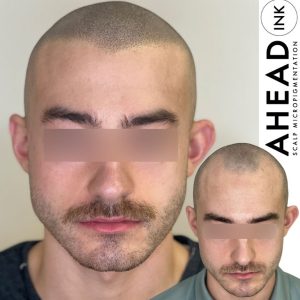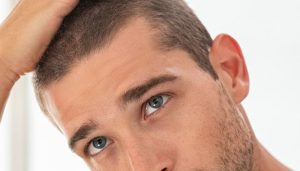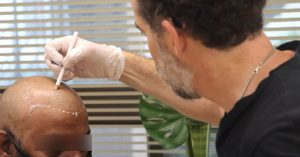Hair Loss sucks and no one wants to go through expensive surgery to fix the problem, right?
Well, hair transplant surgery is actually a very good solution—for the right candidates! We’ll
discuss in another blog exactly who might fit that category. But for now let’s have a look at
three effective, non-surgical solutions for hair loss.
- Medical Intervention: There are two Pharmaceutical solutions for hair loss; Finasteride and
Minoxidil. Both are FDA approved and have decent studies to back up their effectiveness in
preventing hair loss, and in some cases even regrowing hair. You must always discuss with
your physician before taking an oral medication.
Finasteride— more commonly referred to as Propecia (which is the brand name) —comes in pill
form and requires a doctor’s prescription. This particular drug was created to block BPH, a
male hormone that causes an enlarged prostate. It was discovered that it also blocks DHT the
testosterone that cause male pattern baldness. Now while this drug can be very effective it
does have potential side effects, most notably studies show a small percentage of men
experience erectile disfunction. The majority of men who experience this will see it subside
once they stop taking the pill. Also please note women cannot take this drug and you can get it
cheaper by opting for the generic brands, you’ll just need to cut the pill to get the proper
dosage.
The other option for medical intervention is Minoxidil also known by its brand name, Rogaine.
This comes in two forms: topical and oral/pill. The former can be purchased over the counter
as a liquid or a foam. From personal experience the liquid can be messy to apply whereas the
foam is more like a hair styling mousse. There are mild side effects like itchy, dry or irritated
scalp. Also please note that we don’t recommend using this product if having Scalp
Micropigmentation (another non-surgical hair loss solution we’ll discuss). The oral version of
Minoxidil does require a prescription but the good news is it is available for both men and
women. - Topical or Cosmetic Camouflage: Some people are asking, “Does canned spray on ‘hair’
actually look like real hair?” Well, there’s two types of temporary cosmetic cover-up; hair fibers
and make-up products. Both are similar in that they cut the contrast of hair to scalp (so color
choice is important) but there are some differences. They do not look like actual hairs, however,
they can be effective in providing a thickening effect.
The most popular, recognized brand of hair fiber is Toppik and it’s become available not only
directly through the manufacturer but also at some retail drug store locations such as
Walgreens and CVS. There are of course other choices but they all perform the same basic
function, and that is to give actual volume to your thinning hair. This works by clinging to the
existing hair fibers and giving them bulk. The increase in density decreases the scalp visibility,
and it also prevents light from reflecting off your scalp. The drawbacks to this product are that
it can be difficult and messy to apply (especially at first). It also has the potential to run when
wet or rub off. It is recommended you “seal” this product with hair spray to make it last longer.
You also would most likely want to was this product out daily making application more time
consuming.
Another choice for concealing thinning hair is make-up products such as Dermatch. This is like
a make-up pad and is applied similarly. You take an applicator, slightly wet the foam tip, and
rub it across the pad. You then apply the product directly to your scalp. This works mainly to
shade your scalp, however some of the product will also cling to your hair fibers giving it some
density much like Topik. The end result is not as dense as hair fibers, though, and your hair will
be a bit more see-through. The advantage of this product is that it’s easier and less messy to
apply, and it doesn’t require hair spray to seal it on. It is water proof and you can go a few days
between washes. From our experience it can rub off on pillowcases.
Both of these products are fine solutions, however they do require some maintenance and
practice to apply. You also need to find the right color choice and be wary of not over applying
as it can give a fake, chalky look to your hair. Also, we do not recommend this for men or
women shaving their heads. - Scalp Micropigmentation aka SMP or Tricopigmentation
SMP has been around for over a decade now and has become a proven and effective hair loss
treatment for both men and women, There are two basic types of clients who seek out SMP as
a solution: Shaved Look clients and Long Hair Thickening clients.
Shaved Look clients are those that typically have significant visible hair loss and are shaving
their sides and back down with a zero guard or closer. The goal is to give these clients a
hairline that aesthetically frames their face and provide full density to their back essentially
eliminating any horseshoe pattern. Clients who seek this out are those with male pattern
baldness, female pattern baldness, and Alopecia (aerata, universals, scarring, etc.). The SMP
technician will inject pigment using a single or triple needle and make tiny impressions that
replicate the look of shaved hair stubble. This is usually done over the course of three sessions
to give the finished product a look a depth and realism.
Thickening Effect clients are those that wish to keep their hair long. Ideally these clients will
have stabilized their hair loss through either or both medical intervention (as mentioned in the
first part of this blog) and hair transplantation. The object is to provide permanent shading to
the scalp much like the cosmetic coverup products do. The technique the SMP artist uses
would be the same as that of a Shaved Look client, however heavier application will result in a
better result. This approach is risky however if the client’s hair loss is not stabilized. If you over
saturate the scalp with pigment and they lose more hair the result will be a big mess. So,
caution must be used here.





